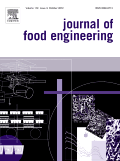
JOURNAL OF FOOD ENGINEERING
metrics 2024
Unlocking the potential of food science and engineering.
Introduction
JOURNAL OF FOOD ENGINEERING, published by ELSEVIER SCI LTD, stands as a leading platform for innovative research within the realm of food science, focusing on the engineering principles applied to food production and processing. With an impressive impact factor reflective of its significance in the field, the journal boasts a Q1 ranking in Food Science and ranks #23 out of 389 in Agricultural and Biological Sciences according to Scopus metrics, placing it in the 94th percentile among its peers. Since its inception in 1982, the journal has aimed to disseminate high-quality, peer-reviewed research that informs and shapes industry practices and academic explorations. Although it does not currently offer an open access option, the journal is dedicated to fostering knowledge and innovation through rigorous editorial standards and a commitment to covering a broad range of topics related to food engineering. Researchers, professionals, and students alike will find the journal an invaluable resource for advancing their understanding of the scientific and technological facets of food systems.
Metrics 2024
 1.16
1.16 5.30
5.30 5.30
5.30 217
217Metrics History
Rank 2024
Scopus
IF (Web Of Science)
JCI (Web Of Science)
Quartile History
Similar Journals
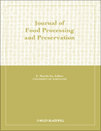
JOURNAL OF FOOD PROCESSING AND PRESERVATION
Advancing Food Science through Innovative ResearchJOURNAL OF FOOD PROCESSING AND PRESERVATION, published by Wiley-Hindawi, stands as a vital resource within the fields of Food Science, Chemical Engineering, and Chemistry. With an ISSN of 0145-8892 and an E-ISSN of 1745-4549, the journal has been a beacon of knowledge since its inception in 1977, continuing to provide valuable insights to the research community until 2024. Recognized for its quality, it holds a noteworthy Q2 ranking in 2023 across multiple categories, including Food Science and Chemical Engineering, indicating its influential contribution to the academic discourse. Although it offers no open access, the journal remains a crucial platform for disseminating groundbreaking research and innovative methodologies in food processing and preservation. Researchers, professionals, and students can significantly benefit from its comprehensive reviews, original research articles, and case studies, aimed at advancing knowledge and practices in food technology. By bridging the gap between theoretical advancements and practical applications, the JOURNAL OF FOOD PROCESSING AND PRESERVATION plays an essential role in addressing global food safety, sustainability, and quality challenges.

Foods
Uniting Disciplines for Comprehensive Food Insights.Foods is a premier open access journal published by MDPI, based in Switzerland, that has been at the forefront of disseminating high-quality research in the fields of food science, health professions, and plant science since its establishment in 2012. With an impressive convergence of interdisciplinary studies spanning various aspects of food, nutrition, and microbiology, the journal aims to provide a comprehensive platform for researchers and professionals to share innovative ideas and findings. Maintained as a Q1 journal in multiple categories for 2023, including Food Science and Health Professions, Foods has garnered significant recognition within the academic community, reflected in its strong Scopus rankings and percentiles across various disciplines. The journal not only promotes open access to enhance the visibility and accessibility of research but also encourages the exploration of sustainable food systems and health-related issues, thus contributing to essential discussions in today's society. For those looking to advance their understanding and expertise in food-related sciences, Foods serves as an enduring resource for groundbreaking studies and critical insights.
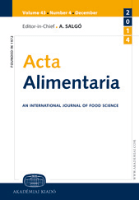
ACTA ALIMENTARIA
Elevating knowledge in food microbiology and safety.ACTA ALIMENTARIA is a renowned journal in the field of food science, published by AKADEMIAI KIADO ZRT, based in Hungary. Since its inception in 1973, it has served as a vital platform for disseminating high-quality research on food chemistry, microbiology, nutrition, and technology, contributing significantly to the advancement of knowledge in the agricultural and biological sciences. Currently classified in the Q3 quartile of the 2023 Food Science category, the journal is positioned to address pressing issues pertaining to food safety, quality, and sustainability, making it an invaluable resource for researchers, professionals, and students alike. Although it does not currently offer open access, the journal maintains a strong reputation with a readership keenly interested in the latest developments in food science. With a Scopus rank placing it in the 38th percentile of its category, ACTA ALIMENTARIA continues to be a pivotal reference for those engaged in food research and innovation.
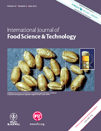
INTERNATIONAL JOURNAL OF FOOD SCIENCE AND TECHNOLOGY
Shaping the Landscape of Food Science ResearchINTERNATIONAL JOURNAL OF FOOD SCIENCE AND TECHNOLOGY, published by WILEY, serves as a premier platform for the dissemination of cutting-edge research in the field of food science and technology. With an ISSN of 0950-5423 and E-ISSN 1365-2621, this journal has been committed to publishing high-quality research since 1966 and is set to continue its impactful contributions through 2024. Recognized for its excellence, it holds a Q1 ranking in Food Science and a Q2 ranking in Industrial and Manufacturing Engineering as of 2023. The journal ranks #95/384 in Industrial and Manufacturing Engineering and #100/389 in Food Science on Scopus, placing it within the top quartiles of these fields. Although it does not currently offer Open Access, researchers and professionals benefit from access to a wealth of knowledge that advances understanding in both applied and theoretical aspects of food science. This journal is indispensable for anyone in the academic and professional domains who seeks to stay abreast of innovations and trends shaping the food industry.
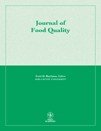
JOURNAL OF FOOD QUALITY
Innovative Research for a Healthier Food FutureThe Journal of Food Quality, an esteemed publication under Wiley-Hindawi, stands as a vital resource in the dynamic field of Food Science, established since 1977 and operating under an Open Access model since 2017. With its seat in the United Kingdom, this journal focuses on delivering high-quality research and insights pertaining to food safety, risk management, and quality assurance, reflected in its impressive Q2 ranking in both Food Science and Safety, Risk, Reliability and Quality categories in 2023. Researchers and professionals will find the journal’s contributions indispensable, particularly given its Scopus rankings that place it in the top echelons of its fields, highlighting its impact and relevance. By fostering an environment of knowledge sharing, the Journal of Food Quality not only enhances academic dialogue but also supports innovation and best practices in food research and industry applications.

Applied Food Research
Elevating Food Science Through Pioneering ResearchApplied Food Research, published by Elsevier, is an esteemed journal that plays a critical role in advancing the field of Food Science. With an ISSN of 2772-5022, the journal has established itself as a premier outlet for high-quality research, achieving a commendable Q1 ranking in the 2023 Food Science category and a 63rd percentile in Scopus rankings for Agricultural and Biological Sciences. Covering a diverse range of topics from food safety to innovative processing techniques, Applied Food Research seeks to publish pioneering studies that enhance our understanding of food systems and contribute to broader discussions on sustainability and nutrition. As it converges on its fourth year of publication, researchers, professionals, and students alike are encouraged to engage with its content through various open access options, ensuring widespread dissemination of knowledge in a field that is vital to global health and well-being. Operating out of Amsterdam, Netherlands, this journal is poised to be an indispensable resource for anyone dedicated to making significant contributions in the domain of food science.

JOURNAL OF THE JAPANESE SOCIETY FOR FOOD SCIENCE AND TECHNOLOGY-NIPPON SHOKUHIN KAGAKU KOGAKU KAISHI
Exploring the Frontiers of Food Science in JapanWelcome to the JOURNAL OF THE JAPANESE SOCIETY FOR FOOD SCIENCE AND TECHNOLOGY-NIPPON SHOKUHIN KAGAKU KOGAKU KAISHI, a pivotal platform for the advancement of food science and technology. Published by the Japan Society for Food Science and Technology, this esteemed journal has been contributing to the field since 1995 and continues to publish innovative research and reviews that foster knowledge and collaboration among researchers, professionals, and students interested in food science. Although it currently holds a Q4 ranking within the Food Science category, the journal's commitment to disseminating valuable insights showcases its potential as a resource for emerging trends and applications in food technology. While it does not offer open access options, it maintains a rigorous peer-review process to ensure the quality of its content. As this journal progresses into its convergence years through 2024, it remains an essential resource for those passionate about exploring the intersections of food science and technology in Japan and beyond.
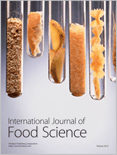
International Journal of Food Science
Pioneering Discoveries in Food TechnologyThe International Journal of Food Science, published by HINDAWI LTD, stands as a crucial platform for advancing knowledge within the realm of food science. Established in 2013, this Open Access journal based in Egypt has garnered significant recognition, achieving an impressive Q2 classification in the 2023 Food Science category, which reflects its commitment to quality and impactful research. With a Scopus rank of #88 out of 389 in Agricultural and Biological Sciences and placing in the 77th percentile, this journal serves as an essential resource for researchers, professionals, and students dedicated to innovative developments and scientific exploration in food science. The journal not only provides unrestricted access to valuable research but also aims to foster collaboration and dissemination of knowledge on critical issues affecting food safety, nutrition, and technology. For those looking to keep abreast of the latest advancements, the International Journal of Food Science is certainly an indispensable addition to their academic pursuits.
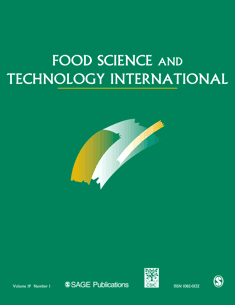
FOOD SCIENCE AND TECHNOLOGY INTERNATIONAL
Advancing innovation in food science and technology.FOOD SCIENCE AND TECHNOLOGY INTERNATIONAL, published by SAGE Publications Ltd, is a premier journal in the fields of food science and technology, serving as a crucial platform for the dissemination of innovative research and practical applications from 1995 through to 2024. With an impact factor reflecting its significant standing—ranking in the Q2 quartile for Chemical Engineering, Food Science, and Industrial and Manufacturing Engineering—this journal plays an instrumental role in advancing the interdisciplinary study of food systems. Researchers, professionals, and students can access high-quality contributions that address the latest developments and trends in food technology, safety, and processing. Located in the United States, FOOD SCIENCE AND TECHNOLOGY INTERNATIONAL also boasts commendable Scopus rankings, ensuring its articles are both relevant and widely cited within the academic community. As a vital resource for anyone engaged in food science research, этот журнал fosters knowledge sharing and innovation in the ever-evolving landscape of food technology.
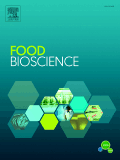
Food Bioscience
Pioneering Research at the Intersection of Food and BiologyFood Bioscience is a leading peer-reviewed journal published by Elsevier, dedicated to advancing the understanding of the complex interplay between food science and biosciences. With an impressive Impact Factor that places it in the Q1 and Q2 quartiles for Food Science and Biochemistry respectively, the journal consistently ranks among the top publications in its field, reflected in its Scopus rankings (Rank #83/389 in Food Science and Rank #175/438 in Biochemistry). Since its inception in 2013, Food Bioscience has fostered a multidisciplinary approach, bridging gaps between research in agricultural, biological, and food sciences, thus encouraging innovative solutions to the pressing challenges facing the global food supply chain. Although it currently operates under a subscription model, the journal is committed to disseminating high-quality research, making significant contributions to both academic scholarship and industry practices. Researchers, professionals, and students alike are invited to explore the wealth of knowledge contained within its pages as it plays a pivotal role in shaping the future of food bioscience.